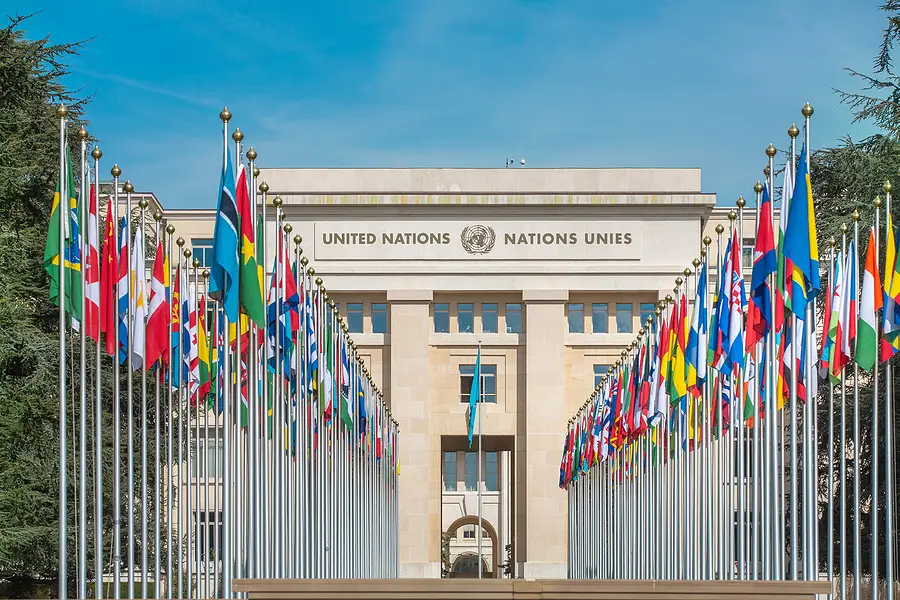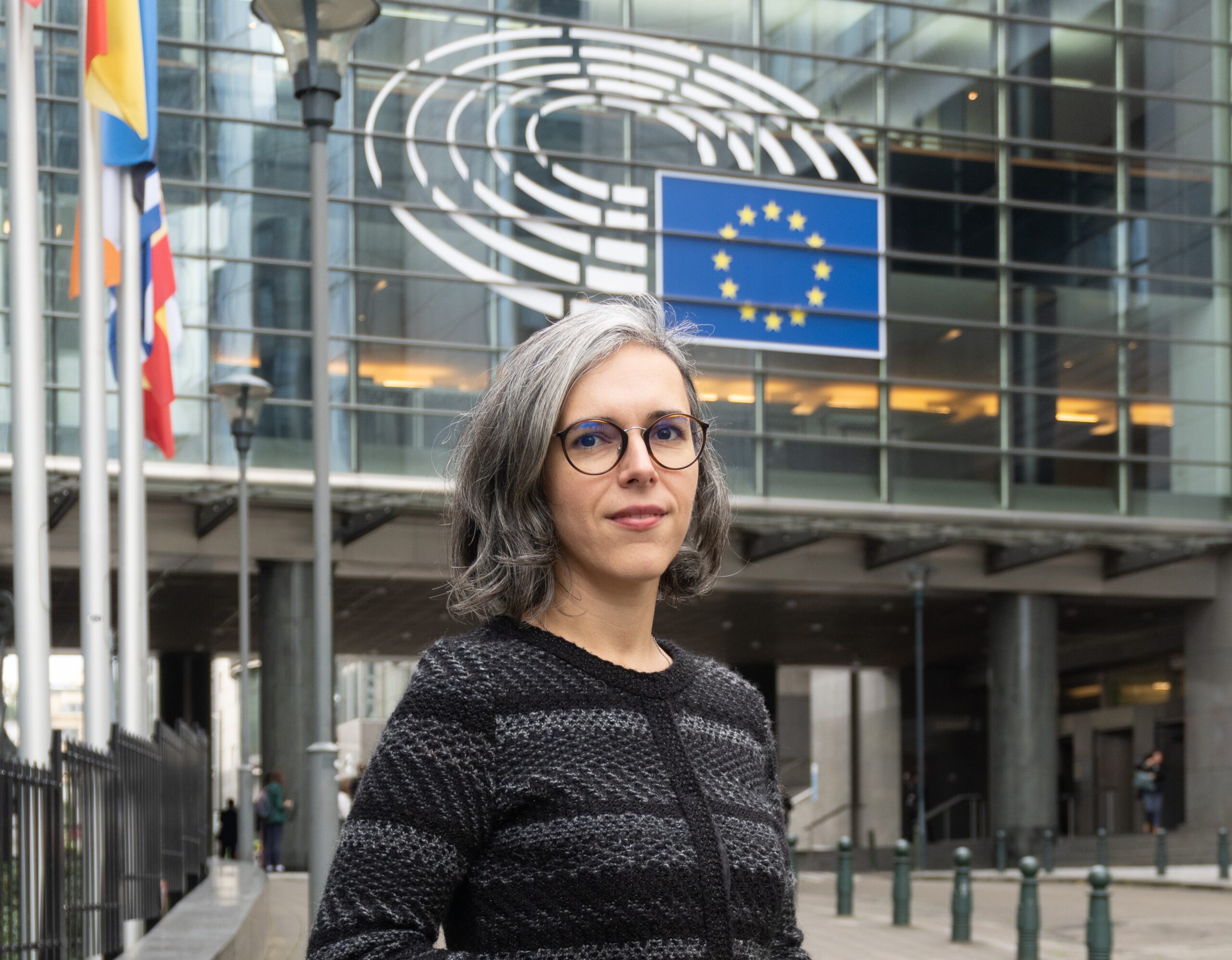A German city has issued a fine against taxi driver Jalil Mashali over alleged unlawful “religious advertising,” because of a small Bible verse sticker on his rear window reading “Jesus – I am the way. The truth. And the life”.
Continue readingWHO pandemic treaty negotiations resume while concerns mount about censorship threats: “cure cannot be worse than the disease”
WHO pandemic treaty draft threatens freedom of expression by requiring governments to manage “infodemics” defined as “too much information”.
Continue readingUN Expert warns Biden Administration: Permitting males in womens’ sports can breach human rights, cause “extreme psychological distress” and risks “physical and sexual attacks”
UN Special Rapporteur on violence against women and girls issues letter warning against proposed Title IX rule change, requiring schools to permit males to compete in female-only sports.
Continue readingLent pro-life volunteers alarmed as Germany considers UK-style censorship zones to criminalise help and prayer near abortion organisations
- New draft law would introduce censorship zones in Germany for behaviour that could be perceived as “confusing” or “disturbing” – potentially including prayer
- Asked about the frequency of “harassment” incidents at abortion facilities that would justify the introduction of censorship zones, the government admitted: “The federal government does not have any concrete numerical findings.”
- German lawyer Dr. Felix Böllmann: “The German government wants to ban something, but doesn’t know what or why”

Berlin (15 February 2024) – During Lent, pro-life volunteers again set to the streets to pray for women and their unborn children. In Germany, however, a new bill plans to introduce vaguely defined censorship zones, banning behaviour that could be perceived as “confusing” or “disturbing” within 100 Meters of abortion organizations with fines up to 5,000€.
The bill has already caused confusion due to its vague wording and disputed necessity. In response to a parliamentary question seeking information on how, when, and where problematic incidents of hindrance or harassment near abortion facilities occurred, the responsible Ministry recently admitted: “The federal government does not have any concrete numerical findings” that would support the need for such a far-reaching bill.
“Thoughtcrimes” in the UK as a warning example
Whereas harassment is already illegal, free speech advocates warn that the language of the bill could criminalise a simple offer of help made to women in crisis pregnancies, as well as prayer. In the UK, where censorship zones have already been introduced, charitable volunteer Isabel Vaughan-Spruce was arrested for praying silently in her head near an abortion facility, as seen in a viral video. With support from ADF International, Vaughan-Spruce was acquitted in court; but two further individuals currently await trial for the same “thoughtcrime”. ADF International is supporting their legal defence.
“The right to peacefully pray is protected by international and national law. No matter one’s opinion on abortion, everyone suffers when we start to censor the right to speak freely, pray, or engage in consensual conversations. The federal government wants to ban something but doesn’t know what or why. This law doesn’t ban “confusion”, it creates more of it – both for citizens trying to understand the law and police officers who will have to enforce any vague new prohibitions,” noted Dr. Felix Böllmann, German lawyer and Director of European Advocacy for ADF International.
The draft bill is currently with the Federal Council and is still open for amendments. It will be voted on in the parliament.
A new video features ADF International spokesperson Ludwig Brühl explaining the detrimental effects of censorship zones: “The government wants to ban certain opinions in an area the size of almost five football pitches.
You are currently viewing a placeholder content from YouTube. To access the actual content, click the button below. Please note that doing so will share data with third-party providers.
More InformationFederal minister Lisa Paus, who is pushing for the bill, said: “if you harass people with expressions of opinion that they clearly don’t want to hear, then this will become an offence punishable with a fine of up to €5,000.” Brühl disagrees: “Of course harassment is rightly prohibited – and has been for a long time. But this is just an excuse to marginalize, punish and censor certain opinions. Pro-life volunteers are there to pray, or to offer information about help available to women who would like to consider other options than abortion.”
ADF International conducts global advocacy for free speech. In the UK and Germany, ADF International lawyers have successfully supported several pro-life volunteers who faced criminal proceedings for their silent prayers.
“The situation is no longer tolerable”: US Congress members continue to denounce Nigeria’s religious freedom violations at House hearing
HFAC subcommittee heard testimony yesterday, raising concern about religious freedom violations in Nigeria, targeted attacks against Christians.
Continue readingEuropean Parliament “strongly condemns” Christmas Eve massacre of Christians in Nigeria, but blames climate change
- The urgency resolution condemns the attacks on Christians while citing “climate change” as a reason for Islamist terror attacks.
- ADF International is actively challenging blasphemy laws in Nigeria, where on average 14 Christians are murdered for their faith every day."
Brussels (8 February 2024) – In an urgency resolution adopted today, the European Parliament “strongly condemns the acts of violence over Christmas targeting Christians” in Nigeria. However, the text does not fully acknowledge the highly detrimental role of Sharia law, Islamic Extremist groups, and the danger of blasphemy accusations but rather elevates “the role of climate change” and “environmental degradation” as root causes.
During Christmas 2023, at least 195 Christians were murdered by Fulani militants in at least 20 communities across Central Plateau State, Nigeria. More than 300 Christians suffered injuries or lost their homes. There are reports of 8 churches burnt down and 15,000 people internally displaced by the attacks. “We were taken unawares, and those that could run ran into the bush. A good number of those that couldn’t were caught and killed with machetes,” local resident Magit Macham told Reuters.
“While we applaud the European Parliament’s recognition of the horrific Christmas massacre targeting Christians, we are disappointed that the resolution downplays the religious causes of the violence while highlighting issues such as climate change. Climate change does not cause people to massacre whole Christian villages,” said Dr. Georgia Du Plessis, Legal Officer for ADF International, after the adoption.
Christians in Nigeria are particularly targeted and vulnerable. In 2021, 90% of all Christians worldwide who were killed for their faith were in Nigeria. On average 14 Nigerian Christians die every day.
MEP: “Insensitive to human suffering when it comes to Christians”
In a debate preceding the adoption of the resolution, several Members of the European Parliament (MEPs) raised concerns about attempts to downplay the role of Islamic extremism and terrorism in the violent attacks and killings.
MEP Bert-Jan Ruissen (ECR) stated that “saying that it is a mere conflict between farmers and herders fails to acknowledge the other causes. It is Muslim extremists causing death and destruction.”
MEP György Hölvényi (EPP) said in his address: “Blinded by ideology, some people are totally insensitive to human suffering when it comes to Christians. The timing of the attacks, brutal killings, and destruction of churches cannot be misinterpreted and can only be understood as the persecution of Christians and we should be able to say so.”
Supreme Court case of Sufi Muslim supported by ADF International could overturn blasphemy laws
For several years already, ADF International lawyers have supported the defence of Sufi Muslim Yahaya Sharif-Aminu, a young Nigerian musician sentenced to death under the blasphemy law of Kano state in northern Nigeria. Yahaya’s alleged crime involved sending song lyrics on WhatsApp that were deemed blasphemous toward the prophet Mohammed.
With support from ADF International, Yahaya appealed his case to the Supreme Court of Nigeria and is challenging the constitutionality of Sharia-based blasphemy laws. The case has the potential to overturn the country’s draconian blasphemy law regime in the northern states. Find more information here.
In May 2022, Nigerian persecution caught global attention when Christian student Deborah Emmanuel Yakubu was stoned and beaten to death, and her body burnt, by her classmates in Sokoto State after they accused her of blasphemy for thanking Jesus for helping her pass an exam. Another Christian woman, Rhoda Jatau, condemned the violence against Yakubu on social media and subsequently faced death threats and mob violence. ADF International is also supporting Jatau’s defense. Find out more here.
US Congress Members challenge Biden Admin over Nigeria’s egregious violations of religious freedom
HFAC moves forward with Nigeria Resolution, calling on Biden Admin to designate country as a CPC for its religious freedom violations.
Continue readingSTATEMENT: ADF International stands for freedom of expression alongside US Congress members, international experts, expressing concern over WHO “pandemic treaty”
ADF International today joined press conference led by Congressman Chris Smith (R-NJ) to express concern over proposed WHO Pandemic Agreement.
Continue readingTwo MPs push for further crackdown on silent prayer despite outcry over “thought crime” arrests
- MPs have approached the Home Office demanding a change to draft guidance on “buffer zones” to censor silent thoughts within 150m of abortion facilities
- Politicians ignore public outcry over incidents of arrests for silent prayer in the past year; ADF UK have supported the legal defence of 3 individuals charged over “thoughtcrime”
LONDON (3 February 2024) – Labour’s Rupa Huq and Conservative Sir Bernard Jenkin reportedly met with the Home Office this week to demand a stronger crackdown on silent prayer occurring within 150m of abortion facilities.
Parliament voted to introduce “buffer zones” as part of the Public Order Act 2023, with vague legislation which would prohibit all forms of “influencing” within a large area of public space near the abortion facility.
The draft guidance issued by the Home Office clarified that the prohibition would not concern silent prayer, nor consensual conversations between adults within the zone. International law requires the UK government to protect freedom of thought as an absolute right. The right to engage freely and consensually in conversations is protected by the fundamental right to freedom of speech.
“The relentless efforts of MPs to further target silent prayer expose the falsity that this campaign is about preventing harassment. We all agree that harassment is wrong, it has always been unlawful and the police have indicated they have the tools to deal with it. In demanding changes to the guidance to ensure it captures prayer, these MPs have unwittingly exposed the reality of who they were seeking to target in the first place,” said Jeremiah Igunnubole, Legal Counsel for ADF UK.
Public Outrage at arrests for silent prayer
The guidance follows various incidents within the past year where, under existing laws, local authorities have introduced local “buffer zones”, and individuals have been arrested merely for praying silently in their minds.
Last year, a video of charitable volunteer Isabel Vaughan-Spruce caused public outrage after she was arrested for saying that she “might be praying inside [her] head.” The footage was viewed over 15 million times on X (formerly Twitter).
Vaughan-Spruce was charged for her thoughtcrime but fully vindicated at Birmingham Magistrates’ Court, who found her “not guilty”. Under the ambiguous language of the Public Order Act, Isabel could potentially face criminal penalties on the basis of the thoughts in her mind in future.
Mounting concerns over UK “thought policing”
“I’ve been arrested twice and fully vindicated by a court verdict that upheld my freedom of thought, and yet even still, officers can continue to interrogate me for the simple act of thinking prayerful thoughts on a public street. This isn’t 1984, but 2023. No matter one’s beliefs on abortion, nobody should be punished merely for the prayers they hold inside their head.
Ahead of the new ‘buffer zones’ law being implemented, there is an urgent need for clarity as to everybody’s right to freedom of thought, as is protected in international human rights law. The Home Office’s draft guidance at least affirms that nobody should be criminalised on the basis of their thoughts alone. This is obvious common-sense protection for basic rights that must be upheld,” said Isabel Vaughan-Spruce.
On a different occasion, a Catholic Priest was arrested and charged for holding a sign within a buffer zone reading “praying for free speech”. With support from ADF UK, Father Sean Gough was found “not guilty”.
In a third instance in November 2022, a father of two and army veteran, Adam Smith-Connor, was criminally charged for praying about his own experience of abortion in a “buffer zone”. Over a year from when Adam committed his “thought crime”, he still awaits his trial. ADF UK is supporting his legal defense.
“Over the past 18 months, ADF UK hasresponded to an unprecedented need to support members of the British public facing criminal penalties or trials based merely on the thoughts that they held in their head. The UK must abide by its human rights obligations, under which nobody should be criminalised for their thoughts. It’s vital that we maintain this most basic standard of a liberal democracy. Once we allow for thought to be policed on one issue area, the precedent has been set for these abuses to proliferate.
Nobody should ever face harassment or aggression outside an abortion facility. But the law must protect the rights of those who are there to peacefully live out their convictions through offers of help or even silent prayer. It’s imperative that the Home Office respect these basic principles when finalizing its guidance,” said Jeremiah Igunnubole, legal counsel for ADF UK, the organisation which supported Vaughan-Spruce’s legal defence.
Global voices unite for free speech following Musk’s commitment to challenge “draconian” Irish “hate speech” law
Seth Dillon, Ashley St. Clair, Sara Gonzales, & Andy Ngo among others joining ADF Intl in calling on Ireland to abandon far-reaching censorship bill
Continue reading









